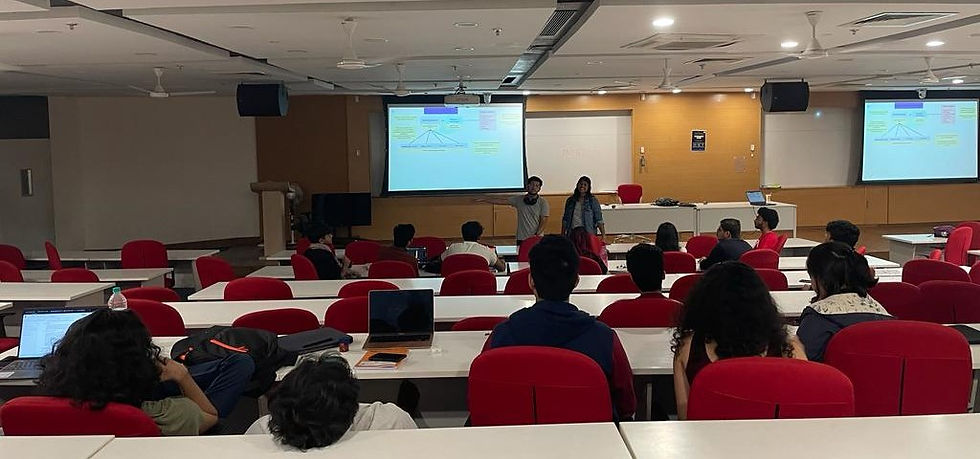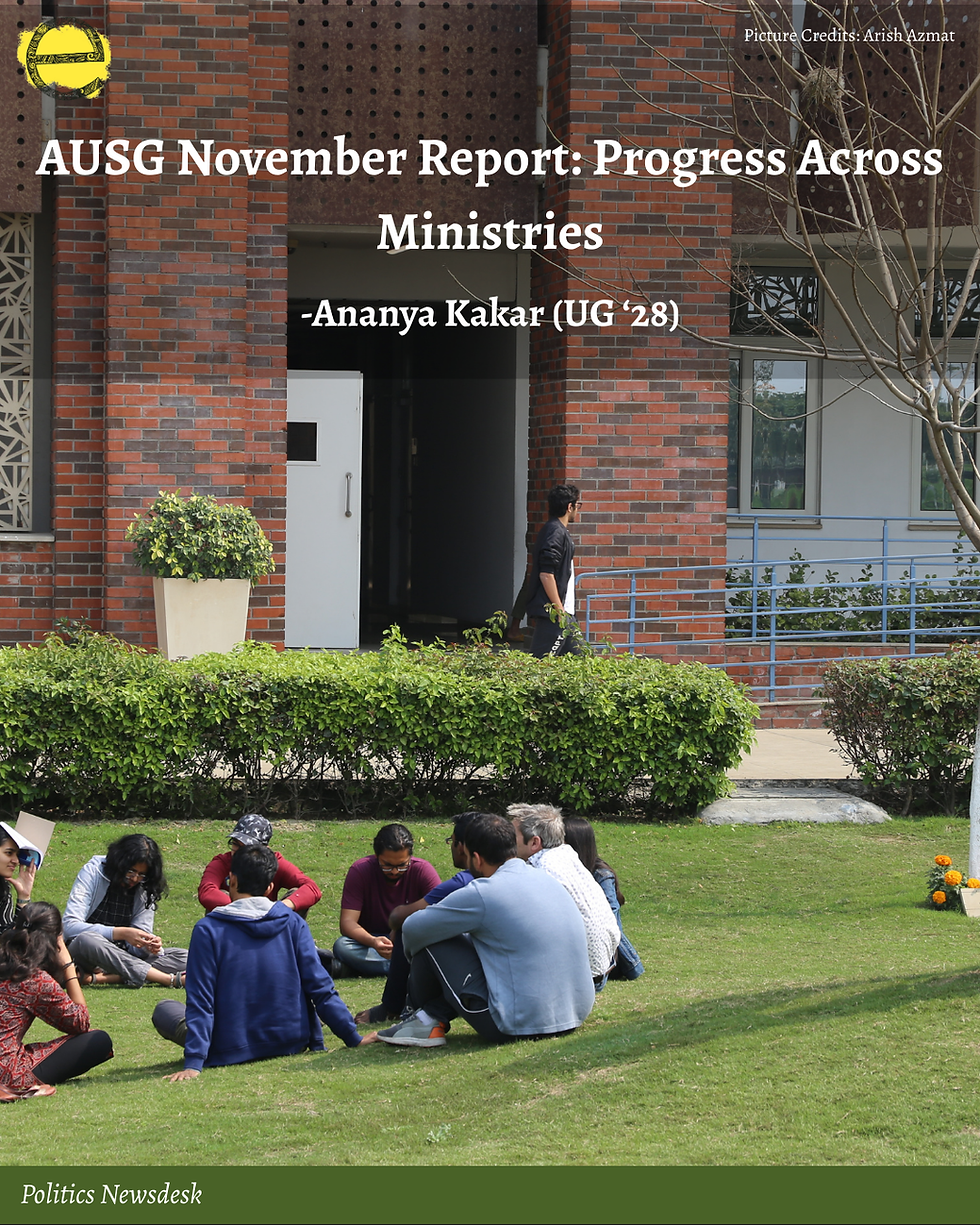What is wrong with the new Constitution and why I will still vote for it
- The Edict
- Nov 5, 2022
- 5 min read
By Sankalp Dasmohapatra
With the Constitution Drafting Committee (CDC) wrapping up yet another open meeting on the 1st of November with limited participation, it seems that the referendum for the new Constitution is finally upon us. For those of you that are unaware (which unfortunately constitutes a significant proportion of the Ashokan population), the CDC was a body composed of both elected and appointed representatives that have worked throughout the summer and large parts of the Monsoon Semester thus far to propose a new constitution intending to fix many of the glaring issues within the present document.
The CDC was intended to be a catalyst to create a new system that managed to revitalize Ashokan student politics in the time of its greatest apathy. With two political parties, Leher (my own) and Sattva having members within the CDC, there was hope that those who were still politically active would use the CDC both as a platform and a tool to begin engaging Ashokans over the summer. This has unfortunately not gone according to plan with participants in online meetings over the summer being limited to political parties, The Edict and the CDC members themselves. This trend carried on into the semester, despite the entrance of a new batch into the University and the first completely offline semester in 3 years.
The fact is that the student body is woefully unprepared to vote on this new Constitution and even if the referendum were to pass – which is a big if – it is far from being a representative vote.

It was, in hindsight, unfair of us to set expectations that political action centered around the technical details of the Student Government (SG)’s functioning would ever generate political participation within the University. Even if it had, it is far too much responsibility to place on one body to attempt to solve the deep-rooted issues of Ashokan apathy that have plagued the SG’s functioning over the past year and a half. The CDC attempted its best with the members that it had (15 at the time of its formation) and while its remaining members (4 at the beginning of the semester post-resignations) faithfully carry out their mandate in the hopes of seeing their work to fruition, there are still problems that will unfortunately be left unaddressed.
The CDC also undertook the massive task of expanding the SG to include cross-cohort participation, something that has been the highlight of the new draft document. Any body that aims to improve representation within an organization must itself be representative in order to succeed. With the only non-Undergraduate (UG) member of the CDC having resigned from the body and non-UG students being essentially non-participative within the process thus far, this goal has clearly not been achieved. If the new system were to come into use, it would depend heavily on the participation of other cohorts, to raise their own cohorts’ concerns as well as participating in the issues of other cohorts. Seeing as this participation has not existed within the UG cohort (the largest of the 4 cohorts), it will be difficult to generate within a new system.
The CDC is to blame for some of these issues. Despite producing a Constitution – one that is contentious even to the few politically active members – its process has been far from perfect. It has been slow with communication, unequal with its distribution of work and its timeline has skewed far from the one initially presented to students. For example, the CDC had announced its last meeting before the referendum on 17th August.
Apart from open meetings, Google Forms, and update announcements via SG, the body has been limited with its interactions towards receiving participation from the student body. Despite these engagement strategies not proving useful within either the online or offline semester, the CDC made no attempt to change how it engaged with students. Even if students were provided numerous opportunities via email or open meetings, it was foolhardy to think that the strategy which hadn’t worked for the SG in the past year would work for the CDC at the time of highest student apathy.
The student body (assuming they are planning to vote in the referendum) finds itself between a rock and a hard place. Either they must vote for a Constitution that they know very little about and risk the associated consequences that may plague the system or vote against it risk a continued period of a lack of student engagement as well as the potential of admin intervention with regards to the Constitution.
As a voter myself, the choice is the former, for a few reasons.
The first is that there must be a functioning SG to both adequately take up student issues as well as maintain important lines of communication and positions of representation that have been fought for over the years. The lack of an adequate House of Representatives has seen many issues not taken up at all and others be taken up by disparate groups of overworked students who cannot command the same level of engagement or the same working power.
The second is that while I have several disagreements with the new Constitution, it is still one written by students and does in large parts attempt to solve many of the bureaucratic obstacles by putting more power in the hands of the voting population. The alternative of having greater admin interventions in decisions impacting students as well as possible Constitutional amendments by the admin is infinitely worse for ensuring that student issues are appropriately taken up and that the mechanisms for these favour students more than they do the admin.
The third is that the CDC in its latest meeting has assured the formation of a Constitutional Review Committee (CRC). This committee, composed of a wholly representative body of students would seek to regularly review the functioning of the Constitution, publish reports on the same and recommend amendments to the HoR. This body would ensure that even if representation is not electorally present, there would be a mechanism that would appropriately account for issues that can and will show up within the functioning of the SG over time.
If there is one thing to take away from this article, it is that no matter what, you should show up to vote in the referendum during this time period. Irrespective of whether that vote is yes or no, a representative vote is a better indicator of whether students have issues with the present document and if it is one that the student body can rally behind. All students, whether affiliated with a political party or otherwise, should read the draft Constitution and give their inputs to ensure that a change of this magnitude is not made half-heartedly.
Note: The writer is a founding member of the political party Leher, of which 2 members are active CDC members.







Comments